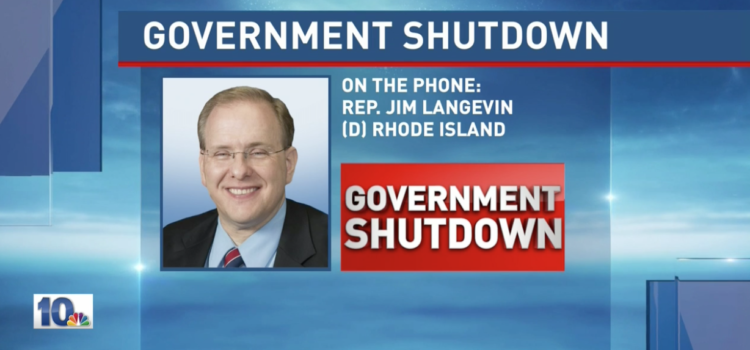By Ethan Hartley
CRANSTON, R.I. – During a time of the year characterized by excessive consumption of food, the Rhode Island Community Food Bank’s recently released 2018 status report on hunger paints an unfortunate picture as to the state of food insecurity in the state.
The problem of people going hungry in the land of plenty, the report indicates, is getting significantly worse in Rhode Island – not better, even amidst what many perceive to be an improving economic picture overall.
“The economy in Rhode Island is thriving,” said Andrew Schiff, president and CEO of the Rhode Island Community Food Bank, on Monday during a press conference releasing their findings. “Unemployment is 3.8 percent, which is remarkably low, and because we have low unemployment, that’s putting pressure on wages and wages are improving – that’s all good.”
“The problem is that wages have not kept pace with the high cost of living,” he continued.
According to food bank data, the number of Rhode Island houses reporting very low food security increased from 16,800 households between 2005 and 2007 to 24,500 households between 2015 and 2017 – which constitutes a 45 percent increase in those experiencing a high degree of food insecurity in the state. The USDA recently reported that one in eight households in the United States are unable to afford adequate food, according to Schiff.
“Over the past 10 years the prevalence of hunger has increased significantly in Rhode Island,” Schiff said. The report indicates that the food bank, through its network of 158 member agencies, serves 53,000 people each month in 2018, as compared to 37,000 each month in 2008, an increase of 43 percent.
A major contributor to the problem has been the rising cost of food, which the food bank assessed through a study of the prices of 71 ingredients needed to adequately feed a family of four breakfast, lunch and dinner for a week. Prices were logged during the summers of 2016, 2017 and 2018, and showed that 45 out of the 71 items increased in cost. In total, the shopping list saw a 15-percent increase in price.
Schiff said that people fortunate enough to make decent money probably haven’t even realized the increase. However, for low-income individuals and families, the rise in food costs has far surpassed average wage growth in the country, which the U.S. Department of Labor calculated to be just 5 percent in average weekly earnings for nonsupervisory employees in the country between July 2016 and July 2018.
Combined with the high price of housing and the increased cost of things like utilities – gas prices, for example, were 60 cents cheaper on average two years ago than today – Schiff said it creates a powerful combination that leaves many families faced with a terrible situation.
“Most families can absorb a 15 percent increase in food costs – many people don’t even notice that kind of increase in food costs,” he said. “But for low-income families, people working at low wages, senior adults at low, fixed incomes, there is no way to absorb this increase in costs. Instead, they run out of money for food and they run out of food.”
SNAP on the chopping block
Compounding the Food Bank’s concerns about low-income families’ access to food is the potential for Congress to cut $18.8 billion in funding over the next 10 years for the Supplemental Nutrition Assistance Program (SNAP) in negotiations of the next Farm Bill, which provides funding for the program. Schiff said the Food Bank sharply opposed those cuts and called on congressional representatives to do the same.
Schiff talked about how the report showed that the SNAP program is already falling short of providing enough food for those most in need. SNAP benefits are based on the USDA’s “Thrifty Food Plan,” which estimates the weekly cost of food for a family of four to be $148.20, however, the average household in the U.S. spends 1.5 times that amount. There are 159,000 Rhode Islanders enrolled in SNAP benefits.
“This is also a missed opportunity, from our point of view,” Schiff continued. “We think this was an opportunity to actually improve and strengthen SNAP benefits. You see from the report that SNAP benefits are falling short. The Farm Bill could be a place where we make sure that SNAP benefit levels reflect the real cost of food and keep up with rising food costs.”
Congressman Jim Langevin said he was in total opposition of cuts to SNAP through an email exchange on Tuesday.
“No one in our state should go hungry. The fact that the Rhode Island Community Food Bank serves nearly five percent of our state population each month shows how far we still need to go to provide food security to every Rhode Islander,” he wrote. “Unfortunately, Republicans in Congress have proposed deep cuts to [SNAP] that would pull the rug out from under families working to make ends meet. I strongly oppose slashing SNAP funding, and I will continue to fight to increase wages for working families so they can keep food on their table.”
Langevin also said he supported efforts like those seen from the Center for EcoTechnology in Massachusetts, which strives to reduce food waste.
“Almost 40 percent of food produced in the United States is wasted, and we must do better in getting that to people in need,” Langevin wrote.
A call for more funding
During the press conference, Schiff made a plea to the state to provide more funding so it may better meet the needs of low-income, food-insecure Rhode Islanders. Out of their $15.8 million budget, only $175,000 of that comes from the state, amounting to just over 1 percent. Another two percent comes from the federal government, only in the form of grants and incentive programs rather than outright dollars.
To help make the argument that they deserve additional funding, Schiff brought up Sherie Griffin, Executive Director of Community Access for Farm Fresh RI, to explain the benefits of programming offered by the Food Bank and its network affiliates.
She explained how families can get more out of their SNAP dollars by participating in the Healthy Habits program, which is a nutrition education program that teaches participants to stretch limited funds by preparing nutritious, vegetarian meals.
This can be achieved in part by participating in the other SNAP-related program, Bonus Bucks, which began in 2009 as a pilot program where those on SNAP could earn 40 cents back on every dollar spent on locally grown fruits and vegetables at farmers’ markets. Now, those on SNAP earn an entire dollar for every dollar spent on local fruits and veggies at any of the 29 markets across the state.
Griffin said that the amount of people on SNAP utilizing Bonus Bucks increased by 41 percent from last year, and the number of people using SNAP benefits at farmers’ markets overall increased by 37 percent from last year – indicative that more people are aware of the benefits and looking to incorporate healthier choices into their diets as well.
In total, the food bank distributed over $150,000 on incentive-based food aid so far this year. Of the 143 farms and food businesses that participate in the Bonus Bucks program, the total amounts to around $250,000 spent on local produce. Of those participants, 70 percent of the Bonus Bucks and SNAP funding that was used in just the Providence, Pawtucket and Woonsocket markets went to urban farmers owned by women, people of color and immigrants.
“Not only is this food assistance really impacting low-income shoppers who are buying there, it is also impacting the sellers,” Griffin said. “This is a community feeding a community with the assistance of this program. Not only are we working to end hunger, but we’re working really to build the local economy.”
“It’s now time for the state to get involved too,” Schiff said. “This is a win-win. You have a program that is helping low-income families stretch their SNAP benefits, and at the same time, you’re helping Rhode Island farmers. This seems like the perfect project for the state to get behind.”
Multiple state representatives responded to an inquiry about possible increasing the funding towards the Rhode Island Community Food Bank.
“I strongly support increasing support for all of our community food banks in this time of increased food insecurity for Rhode Island families,” said Rep. Joseph McNamara. “If we really want to eliminated the disparities that exist in education, we must ensure that the basic needs of Rhode Island children are met. That includes adequate food and shelter.”
Rep. Evan Shanley said he would support re-allocating additional funds from the legislative grant program towards the Rhode Island Community Food Bank.
House majority leader K. Joseph Shekarchi said he was supportive of increasing the funding in general, but would take a judicious approach to their request the same as he would any other request for funding – and there’s always a lot of groups looking for increases to their funding, he mentioned.
“No one should be hungry today in 2018,” he said. “I don’t mind funding social service programs, I just want to make sure the money goes to what it is supposed to be going towards.”
Whether or not the state will wind up providing additional funding, the heart and soul of community food banks will always primarily be the members of the communities they serve, as Nicki Tysca, executive director of the East Bay Food Pantry pointed out.
“We have 158 food pantries [in the state],” she said. “I encourage everyone to find that food pantry that is in your neighborhood – it’s there, it’s in your community – find them and help however you can. Whether it’s a small monetary donation, going out and volunteering, starting food drives in your neighborhood or in your child’s school, we really, really depend on the generosity of the community.”













